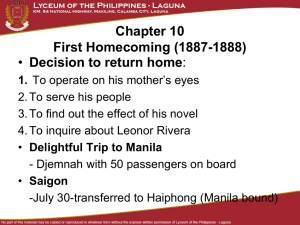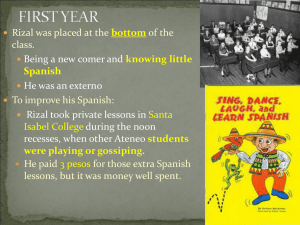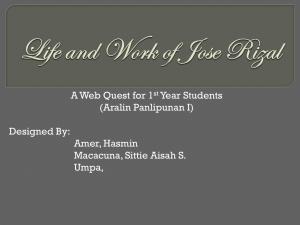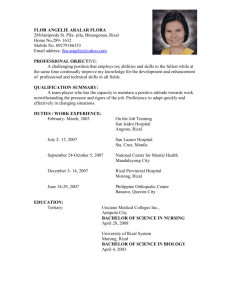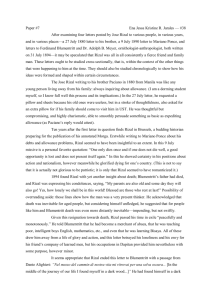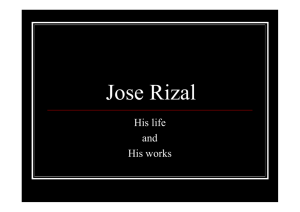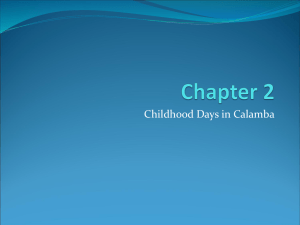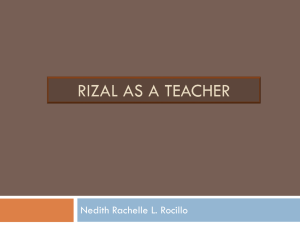CHAPTER 7: PARIS TO BERLIN IN PARIS After completing his
advertisement
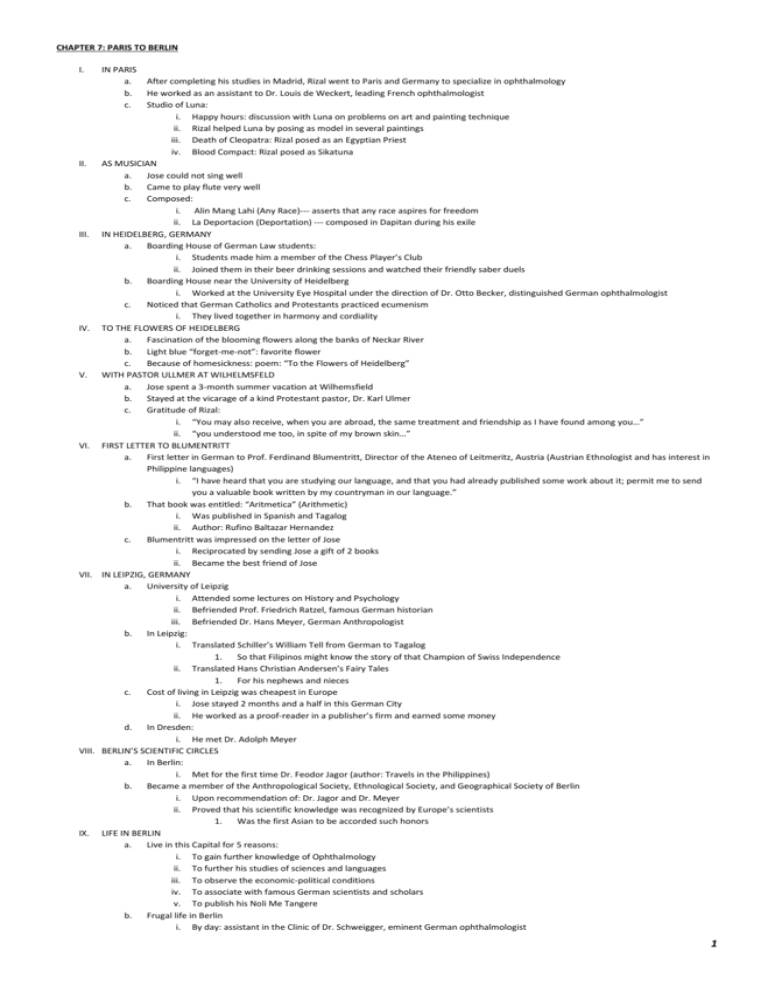
CHAPTER 7: PARIS TO BERLIN I. IN PARIS a. b. c. After completing his studies in Madrid, Rizal went to Paris and Germany to specialize in ophthalmology He worked as an assistant to Dr. Louis de Weckert, leading French ophthalmologist Studio of Luna: i. Happy hours: discussion with Luna on problems on art and painting technique ii. Rizal helped Luna by posing as model in several paintings iii. Death of Cleopatra: Rizal posed as an Egyptian Priest iv. Blood Compact: Rizal posed as Sikatuna II. AS MUSICIAN a. Jose could not sing well b. Came to play flute very well c. Composed: i. Alin Mang Lahi (Any Race)--- asserts that any race aspires for freedom ii. La Deportacion (Deportation) --- composed in Dapitan during his exile III. IN HEIDELBERG, GERMANY a. Boarding House of German Law students: i. Students made him a member of the Chess Player’s Club ii. Joined them in their beer drinking sessions and watched their friendly saber duels b. Boarding House near the University of Heidelberg i. Worked at the University Eye Hospital under the direction of Dr. Otto Becker, distinguished German ophthalmologist c. Noticed that German Catholics and Protestants practiced ecumenism i. They lived together in harmony and cordiality IV. TO THE FLOWERS OF HEIDELBERG a. Fascination of the blooming flowers along the banks of Neckar River b. Light blue “forget-me-not”: favorite flower c. Because of homesickness: poem: “To the Flowers of Heidelberg” V. WITH PASTOR ULLMER AT WILHELMSFELD a. Jose spent a 3-month summer vacation at Wilhemsfield b. Stayed at the vicarage of a kind Protestant pastor, Dr. Karl Ulmer c. Gratitude of Rizal: i. “You may also receive, when you are abroad, the same treatment and friendship as I have found among you…” ii. “you understood me too, in spite of my brown skin…” VI. FIRST LETTER TO BLUMENTRITT a. First letter in German to Prof. Ferdinand Blumentritt, Director of the Ateneo of Leitmeritz, Austria (Austrian Ethnologist and has interest in Philippine languages) i. “I have heard that you are studying our language, and that you had already published some work about it; permit me to send you a valuable book written by my countryman in our language.” b. That book was entitled: “Aritmetica” (Arithmetic) i. Was published in Spanish and Tagalog ii. Author: Rufino Baltazar Hernandez c. Blumentritt was impressed on the letter of Jose i. Reciprocated by sending Jose a gift of 2 books ii. Became the best friend of Jose VII. IN LEIPZIG, GERMANY a. University of Leipzig i. Attended some lectures on History and Psychology ii. Befriended Prof. Friedrich Ratzel, famous German historian iii. Befriended Dr. Hans Meyer, German Anthropologist b. In Leipzig: i. Translated Schiller’s William Tell from German to Tagalog 1. So that Filipinos might know the story of that Champion of Swiss Independence ii. Translated Hans Christian Andersen’s Fairy Tales 1. For his nephews and nieces c. Cost of living in Leipzig was cheapest in Europe i. Jose stayed 2 months and a half in this German City ii. He worked as a proof-reader in a publisher’s firm and earned some money d. In Dresden: i. He met Dr. Adolph Meyer VIII. BERLIN’S SCIENTIFIC CIRCLES a. In Berlin: i. Met for the first time Dr. Feodor Jagor (author: Travels in the Philippines) b. Became a member of the Anthropological Society, Ethnological Society, and Geographical Society of Berlin i. Upon recommendation of: Dr. Jagor and Dr. Meyer ii. Proved that his scientific knowledge was recognized by Europe’s scientists 1. Was the first Asian to be accorded such honors IX. LIFE IN BERLIN a. Live in this Capital for 5 reasons: i. To gain further knowledge of Ophthalmology ii. To further his studies of sciences and languages iii. To observe the economic-political conditions iv. To associate with famous German scientists and scholars v. To publish his Noli Me Tangere b. Frugal life in Berlin i. By day: assistant in the Clinic of Dr. Schweigger, eminent German ophthalmologist 1 ii. By night: attended lectures in the University of Berlin ON GERMAN WOMEN a. Addressed to his sister Trinidad: i. German women: 1. Serious, diligent, educated, friendly 2. Not: gossipy, frivolous, quarrelsome like the Spanish woman. 3. Not particular about beautiful dresses and expensive jewelry ii. Filipino women: 1. Women are more interested in how they dress than in how much they know 2. If only they can cultivate their intellect by education and by taking more interest in worldly affairs, they can command the respect of all men. iii. Rizal advised his sister: 1. Read while you are young. 2. Not allow yourself to be conquered by indolence because it costs so little to cast it off. XI. GERMAN CUSTOMS a. On Christmas Eve: i. Pine tree as a Christmas tree b. When a man attends a social function and finds that there is nobody to introduce him to the other guests, he bows his head to the guests i. Introduces himself and shakes the hands of everyone in the room. ii. It is bad manners for a guest to remain aloof, and wait for his host or hostess to make the proper introduction. XII. DARKEST WINTER IN BERLIN a. Jose live in poverty because no money arrived from Calamba i. The diamond ring which Saturnina gave him was in the pawnshop ii. He could not pay his landlord iii. He had to scrimp, eating only one meal a day iv. Jose starved and shivered with wintry cold. v. His health broke down due to lack of proper nourishment vi. He feared he was going to be sick with tuberculosis b. In Calamba: i. Paciano tried desperately to raise money ii. Crops had failed due to the ravages of the locusts. iii. The sugar market collapsed. X. CHAPTER 8: NOLI ME TANGERE PUBLISHED IN BERLIN I. IDEA OF WRITING A NOVEL IN THE PHIILIPPINES a. The bleak winter of 1886 was memorable in the life of Rizal for two reasons: i. First: it was a painful episode for he was angry and sick in a strange city ii. Second: after enduring so much suffering, it brought him great joy that his Noli Me Tangere came off the press in March 1887. 1. Dr. Maximo Viola arrived in Berlin at the height of his despondency and loaned him the needed funds to publish the novel. b. His reading of Harriet Beecher Stowe’s Uncle Tom’s Cabin i. Portrays the brutalities of American slave-owners and the pathetic conditions of the unfortunate Negro slaves ii. This inspired Jose to prepare a novel that would depict the miseries of his people under the lash of Spanish tyrants c. Proposal of the Novel to a group of Filipinos i. His proposal was unanimously approved ii. But: it did not materialize 1. Those who were expected to collaborate did not write anything 2. Everybody want to write on women 3. Jose was disgusted: his companions wasted their time gambling or flirting with girls iii. Thus: he wrote the novel alone II. THE WRITING OF THE NOLI a. He almost hurled the novel into flames i. He was sick and penniless in Berlin while doing its final revisions ii. He saw no hope of having it published III. VIOLA, SAVIOR OF THE NOLI a. A scion of a rich family in San Miguel, Bulacan b. Viola finance the printing cost of the Noli c. To save printing expenses: Jose deleted some passages in his manuscript IV. RIZAL SUSPECTED AS FRENCH SPY a. Chief of Police in Berlin visited Jose’s boarding house and asked his passport i. Jose could not produce a passport, for he had none (it was possible in those days to travel without a passport) ii. The chief told him to secure a passport within 4 days, otherwise he would be deported b. Jose went to the Spanish embassy i. The ambassador failed to attend to this matter for it turned out that he had no power to issue the required passport c. At the expiration of the 4-day ultimatum i. Jose presented himself at the office of the German police chief ii. He apologized for his failure to obtain a passport and politely asked the chief why he was to be deported when he had not committed any crime d. Reason of the Police Chief: i. He had received intelligence reports that Jose made frequent visits to the villages and little towns in the rural areas ii. This aroused the German government’s suspicion that he was a French Spy iii. At that time: relations between France and Germany were strained on account of Alsace-Lorraine e. Response of Jose: i. In fluent German language: he explained to the chief that he was not a French Spy, but was a Filipino physician and scientist, particularly an ethnologist. 2 ii. As an ethnologist, he visited the rural areas of the countries he visited to observe the customs and life-styles of their simple inhabitants. f. Reaction of the Chief: i. Was impressed with Jose’s explanation and fascinated by his mastery of the German language and personal charisma ii. The Chief was satisfied and allowed him to stay freely in Germany V. PRINTING OF THE NOLI FINISHED a. In his letter to Blumentritt: i. Jose sent one copy to Blumentritt ii. He said: 1. It is the first impartial and bold book on the life of the tagalogs 2. The Filipinos will find it the history of the last ten years 3. The Government and the friars will probably attack the work, refuting my arguments 4. But I trust in the God of Truth and in the persons who have actually seen the sufferings at close range 5. I hope I can answer all the concepts which have been fabricated to malign us. VI. THE TITLE OF THE NOVEL a. Noli Me Tangere is a Latin Phrase which means: “Touch Me Not” b. Citing a biblical mistake: i. Noli Me Tangere taken from the Gospel of St. Luke, signify “do not touch me” c. Correct biblical passage: i. Gospel of St John ii. According to St John: First Easter Sunday 1. Magdalene visited the Sepulcher, and Jesus said to her: “Touch me not; I am not yet ascended to my Father, but go to my brethren, and say unto them, I ascend unto my Father, and your Father; and to my God and your God” VII. THE AUTHOR’S DEDICATION a. Recorded in the history of human sufferings is a cancer so malignant a character that the least touch irritates it and awakens in it the sharpest pains. b. I will do with thee what the ancients did with their sick, exposing them on the steps of the temple so that every one who came to invoke the Divinity might offer them a remedy c. I will raise a part of the veil that covers the evil, sacrificing to truth everything. i. As thy son I am conscious that I also suffer from thy defects and weaknesses VIII. SYNOPSIS OF THE NOLI a. It begins with a reception given by Capitan Santiago at his house i. In honor of Crisostomo Ibarra 1. A young and rich Filipino who had just returned after 7 years of study in Europe 2. Was the only son of Don Rafael Ibarra (friend of Capitan Tiago) 3. Fiancé of Maria Clara (daughter of Capitan Tiago) b. Lieutenant Guevarra told Crisostomo Ibarra about the sad story of his father’s death i. Don Rafael defended a helpless boy from the brutality of an illiterate Spanish tax collector ii. Don Rafael accidentally killed the tax collector 1. He was thrown in prison where he died unhappily 2. He was buried in consecrated ground, but his enemies, accusing him of being a heretic, had his body removed from the cemetery. 3. But the grave-digger threw the corpse into the lake 4. Padre Damaso was responsible for this iii. Ibarra vowed to find out the truth about his father’s death c. Tasio the philosopher i. Whose ideas were too advanced for his times ii. Public called him “Tasio the lunatic” iii. He is a progressive school teacher, who complained to Ibarra that the children were losing interest in their studies because of: 1. the lack of a proper school house 2. the discouraging attitude of the parish friar towards both the teaching of Spanish and the use of modern methods of pedagogy iv. was pessimistic about the project of Ibarra to build a schoolhouse at his own expense d. Sisa i. Was a formerly rich girl but became poor because she married a gambler ii. She became crazy because she lost her two boys, Basilio and Crispin 1. These boys were sacristanes (sextons) in the church working for a small wage to support their poor mother 2. Crispin (younger) was accused by the brutal sacristan mayor (chief sexton) of stealing the money of the priest a. He was tortured in the convent and died 3. Basilio escaped iii. When the 2 boys did not return home, Sisa looked for them everywhere and, in her great sorrow, she became insane e. Elias i. Was saved by Ibarra from a crocodile while having a picnic with Maria Clara. Elias grappled a crocodile which was caught in the fish corral. He could not subdue it. ii. Warned Ibarra to be careful during the ceremony of the laying of the cornerstone of the schoolhouse because there was a plot to kill him iii. He save Ibarra when the cornerstone of a school collapsed iv. HIS STORY: 1. His grandfather: a. Bookkeeper in a Spanish commercial firm in Manila, was wrongly accused of burning the firm’s warehouse b. He was flogged in public and was left in the street, crippled and almost dead c. His wife (Elias’ grandmother) i. She was pregnant, begged for alms and became a prostitute in order to support her sick husband and their son. ii. After giving birth to her second son and the death of her husband, she fled, with her two sons, to the mountains. 3 iii. iv. BALAT 1. First boy and became a dreaded tulisan 2. He terrorized the provinces 3. Was caught by the authorities; his head was cut off and was hung from a tree 4. His mother died upon seeing this incident Elias’ Father 1. Balat’s younger brother 2. Was kindhearted and became a trusted laborer in the house of a rich man in Tayabas 3. Fell in love with the master’s daughter 4. Girl’s father: enraged by their romance, investigated his past and found out the truth 5. Elias’ father was sent to jail & the girl gave birth to twins a. Elias & a girl b. The master (father of their mother) took care of them c. Keeping their scandalous origin in secret d. They were reared as rich children e. They lived happily until one day, owing to certain dispute over money matters, a distant relative exposed their shameful birth. f. IX. Fiesta in San Diego i. Padre Damaso gave the long sermon, in which he expatiated on the evils of the times that were caused by certain men, who having tasted some education, spread pernicious ideas among people. g. Padre Damaso i. Speaking in the presence of many guests during a dinner, insulted the memory of Ibarra’s father ii. Ibarra jumped from his seat, knocked down the fat friar with his fist, and then seized the sharp knife 1. He would have killed the friar, were it not from the timely intervention of Maria Clara 2. This produced 2 results: a. His engagement to Maria Clara was broken b. He was excommunicated 3. Fortunately: liberal-minded governor general visited the town and befriended Ibarra a. Persuaded Capitan Tiago to accept Ibarra as son-in-law b. Promised to see the Archbishop of Manila to lift the ban of excommunication h. Tiburcio de Espadaña i. Quack Spanish physician ii. Treated the illness of Maria Clara iii. Husband of Doctora Doña Victorina de los Reyes de De Espadaña 1. Vain and vulgar native woman 2. Had hallucinations of being a superior Castillan 3. Although a native herself, she looked down on her own people as inferior beings 4. She added another “de” to her husband’s surname to be more Spanish 5. She introduced to Capitan Tiago a young Spaniard, Don Alfonso Linares De Espadaña, cousin of Don Tiburcio and godson of Padre Damaso’s brother-in-law. a. Linares was penniless and jobless, he came to the Philippines in search of a rich Filipino heiress. i. Attack on the barracks of the Guardia Civil i. Engineered by the enemies of Ibarra 1. The enemies of Ibarra told the supposed attackers of the barracks that the mastermind of their attack was Ibarra 2. At the same time, the enemies warned the alferez (lieutenant of the Guardia Civil) to alert his men of the supposed attack ii. Ibarra was blamed for the catastrophe iii. Elias: 1. Learning of Ibarra’s arrest, burned all the papers that might incriminate his friend and set Ibarra’s house on fire 2. He went to prison and helped Ibarra escape iv. Ibarra 1. Forgave Maria Clara for giving up his letters to her to the Spanish authorities who utilized them as evidence against him. 2. Maria Clara: a. Revealed that those letters were exchanged with a letter from her late mother, Pia Alba, which Padre Salvi gave her. b. From this letter, she learned that her real father was Padre Damaso. v. A police boat pursued Elias and Ibarra 1. Elias told Ibarra to hide under the zacate of their banca 2. As the police boat was overtaking the banca, Elias jumped into the water and swam swiftly toward the shore 3. Elias diverted the attention of the soldiers 4. Ibarra was able to escape 5. Elias was hit by the firing guns of the civil guards and sank j. Elias and Basilio i. Was seriously wounded, reached the shore and staggered into the forest ii. He met Basilio who was weeping over his mother’s dead body iii. He asked Basilio to make a pyre on which their bodies (his and Sisa) were to be burned to ashes iv. Elias murmured: “I die without seeing the dawn brighten over my native land! You, who have it to see, welcome it --- and forget not those who have fallen during the night. THE NOLI BASED ON TRUTH a. Maria Clara was Leonor Rivera b. Ibarra and Elias were Rizal c. Tasio was Paciano d. Padre Damaso: typical of a domineering friar/ arrogant, immoral, and anti-Filipino 4 X. XI. MISSING CHAPTER OF THE NOLI a. “Elias and Salome” i. Reason for deleting this portion: economic ii. Elias to Salome: 1. It is better that it neither you nor I would wish to hear our children lament our love, which would only bequeath them misery 2. Forget me, forget a love so mad and futile RIZAL’S FRIENDS PRAISE THE NOLI a. Of the numerous congratulatory letters received by Rizal from his friends about the Noli, that from Blumentritt was significant. i. Blumentritt: “your work, as we Germans say, has been written with the blood of the heart, and so the heart also speaks ii. The word filibuster must have certain meaning in the Philippines that I do not find in the Spanish of the Peninsulars nor in that of the Spanish peoples of America b. Dr. Antonio Ma. Regidor i. Filipino lawyer who had been exiled due to his complicity in the Cavite mutiny ii. If the Quixote immortalizes its author because it exposes to the world the ailments of Spain, your Noli Me Tangere will bring you an equal glory iii. With your modesty and your voracious and able appraisal, you have dealt a mortal blow to that old tree full of blemishes and decay. CHAPTER 9: RIZAL’S GRAND TOUR OF EUROPE WITH VIOLA I. THE TOUR BEGINS a. Rizal had received Paciano’s remittance of P1000 b. He immediately paid Viola the sum of P300 which the latter kindly loaned so that the Noli could be printed c. He was ready to see Europe before returning to Calamba II. DRESDEN, GERMANY a. Their visit coincided with the regional floral exposition (Rizal was interested in Botany) i. They met Dr. Jagor ii. Dr. Jagor advised Rizal to wire Blumentritt of their coming because the old professor was a nervous disposition and he might suffer a shock at their sudden visit b. In the Museum Art: Rizal was impressed by a painting of “Prometheus Bound” III. FIRST MEETING WITH BLUMENTRITT a. Blumentritt was carrying a pencil sketch of Rizal at the railroad station which Jose sent him, so that he could identify his Filipino friend IV. BEAUTIFUL MEMORIES OF LEITMERITZ a. Blumentritt invited Viola and Jose to a beer garden i. The burgomaster (town mayor) asked Rizal how long it took him to learn German ii. Rizal replied: 11 months. The burgomaster was amazed. b. Rizal painted a portrait of Blumentritt to commemorate his memories at his home c. Letter to Blumentritt: i. I am at heart an inhabitant of Leitmeritz just as you yourself are a Filipino in sentiments ii. He forgot his diamond stickpin at his room in Hotel Krebs V. PRAGUE a. Rizal and Viola visited the tomb of Copernicus, the famous astronomer & the museum of natural history VI. VIENNA a. This city fascinated Rizal because of its beautiful buildings, religious images b. Rizal received his lost diamond stickpin. i. It was found by a maid in Hotel Krebs and was given to Blumentritt, who, in turn, forwarded it to Rizal in Vienna. VII. DANUBIAN VOYAGE TO LINTZ a. Noticed that the passengers on the river boat were using paper napkins during meals, which was a novelty to him i. Viola commented that the paper napkins were more “hygienic and economical than cloth napkins” VIII. FROM LINTZ TO RHEINFALL a. They savor the famous Munich beer, best in Germany b. From Munich, they went to Nuremberg, one of the oldest cities in Germany. i. They witnessed the horrible torture machines used in the Inquisition c. At Rheinfall, they saw the most beautiful waterfall in Europe IX. GENEVA a. Rizal showed his rowing prowess at Leman Lake to Geneva X. RIZAL RESENTS EXHIBITION OF IGORTOS IN 1887 MADRID EXPOSITION a. Upon reaching Geneva (Switzerland), he received sad news from his friends in Madrid of the deplorable conditions of the primitive Igorots who were exhibited in this exposition i. Some died of pneumonia ii. Scanty clothing (G-strings) and crude weapons were objects of mockery and laughter by the Spanish people and the press b. Rizal was outraged; in his letter to Blumentritt: i. Igorots are mocked by Spanish newspapers ii. Except: El Liberal 1. Says that such mockery is not consistent with human dignity to be exhibited side by side with animals and plants c. We want an industrial exposition, but not an exhibition of human beings who are compelled to live almost outdoors and die of nostalgia and pneumonia or typhus XI. RIZAL IN ITALY a. Rizal reached Rome, “the Eternal City” and the “City of Caesar” b. Letter to Blumentritt i. Here I breath the same air which the Roman heroes have breathed ii. I salute every statue with reverence iii. Places visited: Capitolium, Tarpeian Rock, Palatinum, Forum Romanum, Amphitheatre iv. Jose did not enter cafes because he loathed to hear French Songs or see modern industries c. Feat day of St. Peter and St. Paul i. Jose visited the Vatican, “City of the Popes” 5 ii. He visited St. Peter’s Square CHAPTER 10: FIRST HOMECOMING I. DECISION TO RETURN HOME a. After 5 years of memorable sojourn in Europe, he returned to the Philippines & practiced medicine in Calamba b. Because of the publication of the Noli Me Tangere and the uproar it caused among friars, Rizal was warned by Paciano and his friends not to return home. c. Rizal was determined to return to the Philippines for the following reasons: i. To operate on his mother’s eyes ii. To serve his people who had long been oppressed by Spanish tyrants iii. To find out for himself how the Noli and his other writings were affecting Filipinos and Spaniards in the Philippines iv. To inquire why Leonor Rivera remained silent II. DELIGHTFUL TRIP TO MANILA a. The same steamer, Djemnah, which brought him to Europe 5 years ago was enroute to the Orient via the Suez Canal III. ARRIVAL IN MANILA a. He found Manila the same as when he left it 5 years ago i. the same holes in the roads IV. HAPPY HOMECOMING a. Paciano did not leave him during the first days after arrival to protect him from any enemy assault b. In Calamba, Rizal established a medical clinic i. His first patient was his mother ii. Rizal, who came to be called “Doctor Uliman” because he came from germany, treated the ailments of his patients and soon acquired a lucrative medical practice. iii. His professional fees were reasonable, even gratis to the poor. iv. After 6 months, he earned a total of P5000 as medical fees c. Thus, he opened a gymnasium i. European sports is introduced ii. He tried to interest his town mates in gymnastics, fencing and shooting so as to discourage cockfights and gambling. d. Rizal suffered one failure during his 6 months of sojourn in Calamba: i. His failure to see Leonor Rivera ii. He tried to go to Dagupan, but his parents absolutely forbade him to go because Leonor’s mother did not like him for a son-inlaw iii. He was caught within the iron grip of the custom of his time that marriages must be arranged by the parents of both groom and bride. V. STORM OVER NOLI a. Rizal received a letter from Governor General Emilio Terrero i. Requesting him to come to Malacañang Palace ii. Somebody had whispered to the governor’s ear that the Noli contained subversive ideas iii. When Jose was informed by Governor General Terrero of the charge, he denied it 1. Jose explained that he merely exposed the truth but did not advocate subversive ideas iv. Pleased by his explanation and curious about the controversial book, the governor general asked the author for a copy of the Noli so that he could read it. 1. Rizal had no copy then. b. Fr. Federico Faura to Jose (former Jesuit professor of Jose): i. Everything in it was the truth, but you may lose your head for it. c. The governor general, who was liberal minded Spaniard, knew that Rizal’s life was in jeopardy because the friars were powerful. i. For security measure, he assigned a young Spanish lieutenant, Don Jose Taviel de Andrade, as bodyguard of Rizal ii. The governor general was able to secure a copy of Noli from Jose and read it: 1. He found nothing wrong with it d. Faculty members of UST i. Stated that Noli was heretical, impious, and scandalous in the religious order, and anti-patriotic, subversive of public order, injurious to the government of Spain and its function in the Philippine Islands in the political order. e. Governor General Terrero i. Was dissatisfied with the report of the Dominicans, for he knew that the Dominicans are prejudiced against Rizal ii. Terrero sent the Novel to the Permanent Commission of Censorship which was composed of priests and laymen 1. The report of this commission was drafted by its head, Fr. Salvador Font a. It found the Novel to contain subversive ideas against the Church and Spain b. Recommended: the importation, reproduction and circulation of this pernicious book in the islands be absolutely prohibited f. The banning of the Noli only served to make it popular i. Everybody want to read it ii. What the hated Spanish masters did not like, the oppressed masses liked very much g. Thanks to the Governor General Terrero i. There was no mass imprisonment or mass execution of Filipinos ii. He refused to be intimidated by the friars who clamored for harsh measures against people caught reading the novel and its author VI. ATTACKERS OVER NOLI a. Another Augustinian, Fr. Jose Rodriguez published 8 pamphlets under the heading of: “Questions of Supreme Interest” to blast the Noli and other Anti-Spanish writings i. Why should I not read them? ii. Beware of them. Why? iii. And what can you tell me of plague? iv. Why do the impious triumph? v. Do you think there is no really purgatory? vi. Is there or is there no hell? 6 vii. What do you think of these libels? viii. Confession or damnation? b. Copies of these anti-Rizal pamphlets were sold daily in the churches after mass. i. Many Filipinos were forced to buy them in order not to displease the friars VII. DEFENDERS OF THE NOLI a. Rev. Vicente Garcia, a Filipino Catholic priest-scholar (penname: Justo Desiderio Magalang), blasted the arguments of Fr. Rodriguez: i. Rizal cannot be an ignorant man, because he was a graduate of Spanish universities and was a recipient of scholastic honors ii. Rizal does not attack the Church and Spain, because what Rizal attacked in the Noli were the bad Spanish officials and not Spain, and the bad and corrupt friars and not the Church. iii. Fr. Rodriguez said that those who read the Noli Commit a mortal sin; since Rodriguez had read the novel, therefore he also commits a mortal sin VIII. CALAMBA’S AGRARIAN TROUBLE a. Governor General Torrero, influenced by certain facts in Noli, ordered a government investigation of the friar estates to remedy whatever iniquities might have been present in connection with land taxes and with tenant relations b. One of the friar estates affected was the Calamba Hacienda which is owned by the Dominican Order c. Rizal wrote down his findings: i. The hacienda of the Dominican Order comprised not only the lands around Calamba, but also the town of Calamba ii. The profits of the Dominican Order continually increased because of the arbitrary increase of the rentals paid by the tenants iii. The hacienda owner never contributed a single centavo for the celebration of the town fiesta, for the education of the children, and for the improvement of agriculture iv. Tenants who had spent much labor in clearing the lands were dispossessed of said lands for flimsy reasons v. High rates of interests were charged the tenants for delayed of rentals, and when the rentals could not be paid, the hacienda management confiscated their carabaos, tools, and homes IX. FAREWELL TO CALAMBA a. The friars asked the Governor General Terrero to deport Jose, but the latter refused because there was no valid charge against Jose in court. b. Terrero summoned Jose and advised him to leave the Philippines for his own good i. He was giving Jose a chance to escape the fury of the friars’ wrath c. Jose was compelled to leave Calamba for 2 reasons: i. His presence was jeopardizing the safety and happiness of his family and friends ii. He could fight better his enemies and serve his country’s cause with greater efficacy by writing in foreign countries. CHAPTER 11: IN HONGKONG AND MACAO I. THE TRIP TO HONG KONG a. He was 21: first time to leave the country in search of wisdom with beautiful dreams of emancipating his people from bondage by the power of his pen b. He was 27: as forced to leave the country for a second time i. he was an embittered victim of human iniquities and a frustrated reformer. c. Letter to Blumentritt in Hon Kong: i. At last I can write freely. At last I can express my thoughts without fear of censorship from the chief. ii. They forced me to leave my country. Half sick I left the house. d. Jose Sainz de Varanda i. A Spaniard, who was a former secretary of Terrero, shadowed Rizal’s movement in Hongkong ii. He was commissioned by the Spanish authorities to spy on Rizal II. EXPERIENCES IN HONGKONG (2-week visit) a. Diary: i. Noisy celebration of the Chinese New Year which lasted from Feb. 11-13 1. The richer the Chinese, the more firecrackers he exploded (continuous explosions of firecrackers) ii. The Dominican Order was the richest religious order in Hong Kong. 1. It engaged actively in business 2. It owned more than 700 houses for rent and many shares in foreign banks 3. It had millions of dollars deposited in the banks CHAPTER 12: ROMANTIC INTERLUDE IN JAPAN (1 month and a half) I. RIZAL IN TOKYO a. Rizal was visited at his hotel by Juan Perez Caballero, secretary of the Spanish Legation b. Caballero invited him to live at the Spanish Legation i. Jose realized that the Spanish diplomatic authorities were instructed from Manila to monitor his movements in Japan. ii. He accepted the invitation for two reasons: 1. He could economize his living expenses by staying at the legation 2. He had nothing to hide from the prying eyes of the Spanish authorities c. His first days: i. Was embarrassed because he did not know the Japanese language ii. He looked like a Japanese, but could not talk Japanese iii. To avoid further embarrassment: 1. Rizal decided to study the Japanese Language 2. Being a born linguistic, he was able to speak it within a few days. II. RIZAL AND THE TOKYO MUSICIANS a. As he approached the park, Rizal heard the Tokyo band playing a classical work of Strauss b. He noticed that some began to converse in Tagalog. Jose was amazed. III. RIZAL’S IMPRESSION OF JAPAN a. There were very few thieves in Japan i. The houses remained open day and night ii. In the hotel room: one could safely leave money on the table b. Beggars were rarely seen in city streets, unlike in Manila c. One thing he did not like in Japan: 7 i. IV. V. VI. The popular mode of transportation by means of rickshaws draws by men 1. Jose felt disgusted at the way a human being was employed like a horse ROMANCE WITH O-SEI-SAN a. Rizal saw a pretty Japanese girl walking past the legation gate i. He learned from the Japanese gardener that she was Seiko Usui ii. As she approached the gate, Jose took off his hat and politely introduced himself as was the custom in Germany. b. Seiko-san i. Was mildly amused at the gallant of Jose who spoke in halting Japanese ii. The 2 conversed in both English and French --- the language barrier was eliminated c. Since their first meeting, Jose & O-Sei-san met almost daily i. Affinity of interest in the arts paved the way for their romance ii. Her beauty almost tempted Jose to settle in Japan RIZAL ON O-SEI-SAN in his Diary: a. To think that I am leaving this life for the uncertain, the unknown. There I was offered an easy way to live, beloved and esteemed. b. To you I dedicate the final chapter of these memoirs of my youth. No woman, like you, has ever loved me and sacrificed for me. c. Sacrificing his personal happiness, Rizal had to carry on his libertarian mission in Europe VOYAGE ACROSS THE PACIFIC a. RIZAL AND TETCHO i. Tetcho Suehiro: befriended by Jose while on board ii. He was a fighting Japanese journalist, novelist, and a champion of human rights iii. Like Rizal, he was forced by the Japanese government to leave his country iv. He published: Storm over the Sea, which resembles Noli Me Tangere and The Big Ocean, which resembles El Filibusterismo CHAPTER 13: RIZAL’S VISIT TO THE UNITED STATES (less than 1 month) I. ARRIVAL IN SAN FRANCISCO a. His arrival in this country was marred by racial prejudice i. He saw the discriminatory treatment of the Chinese and the Negroes by white Americans b. All passengers were not allowed to land i. The American authorities placed the ship under quarantine ii. Because: it came from the far east where a cholera epidemic was alleged to be raging iii. Rizal was surprise because he knew there was no epidemic at that time in the Far East. c. Jose soon discovered that the placing of the ship under quarantine was motivated by politics i. The ship was carrying coolies (men hired to do cheap labor) ii. At that time, public opinion on the Pacific Coast was against cheap coolie labor because the coolies from China were displacing white laborers in railroad construction camps iii. To win the votes of the whites in California (election was near), the administration impeded the entry of Chinese coolies d. After a week of quarantine, all first-class passengers, including Rizal, were permitted to land i. But the Chinese and Japanese passengers of the second and third-class accommodations were forced to remain on board for a longer quarantine period. II. ACROSS THE AMERICAN CONTINENT a. Rizal left San Francisco for Oakland – Nevada – Utah – Denver – Colorado – Nebraska – Missouri River – Illinois – Chicago – Niagara Falls – Albany – Hudson River – New York – Statue of Liberty III. RIZAL’S IMPRESSION OF AMERICA a. Positive: i. The opportunities for better life offered to poor immigrants ii. Material progress of the country as shown in great cities, huge farms, flourishing industries, busy factories iii. Drive and energy of the American people iv. Natural beauty of the land v. High standard of living b. Negative: i. Lack of racial equality ii. There existed racial prejudice which was inconsistent with the principles of democracy and freedom of which the Americans talk so much but do not practice iii. America is a land par excellence of freedom but only for the whites CHAPTER 14: RIZAL IN LONDON (1888-1889) I. TRIP ACROSS THE ATLANTIC a. Rizal entertained the American and European passengers with his marvelous skill with the yo-yo as an offensive weapon. b. On board, Rizal discussed with some American newspapermen the current social and political problems of mankind and them to be inadequate in geo-politics. i. He could not enjoy their companionship because they were intellectually inferior to him. II. LIFE IN LONDON a. He lived in this city for three reasons: i. To improve his knowledge of the English Language ii. To study and annotate Morga’s Sucesos de las Islas Filipinas, a rare copy of which he heard to be available in the British Museum iii. London was a safe place for him to carry on his fight against the Spanish tyranny b. Boarder of Beckett Family i. Gertrude Beckett: daughter of the owner c. Dr. Reinhold Rost i. Librarian of the Minsitry of Foreign Affairs & authority on Malayan Languages and Customs ii. Recommended him to the authorities of the British Museum iii. Rizal spent much of his time in the British Museum poring over the pages of Morga’s Sucesos III. NEWS FROM HOME, GOOD AND BAD a. Bad News: 8 i. Persecution of the Filipino patriots who signed the “Anti-Friar Petition of 1888” which was presented by Doroteo Cortes to Jose Centeno, Civil Governor of Manila. This petition was signed by about 800 patriots and was written by M. H. del Pilar. It was addressed to the Queen Regent of Spain requesting the expulsion of friars. ii. Persecution of the Calamba tenants, including Rizal’s family and relatives, for their courage to petition the government for agrarian reforms. iii. Furious attacks on Rizal by some Senators in the Spanish Cortes and by some media men in Spanish newspapers iv. Rizal’s brother-in-law, Manuel Hidalgo, husband of Saturnina, was exiled by Governor General Weyler to Bohol without due process of law. v. A friend of Rizal, Laureano Viado, a medical student at the University of Santo Tomas, was arrested and jailed in Bilibid Prison because copies of the Noli were found in his house b. Good News: i. Rev. Vicente Garcia’s defense of the Noli against the attacks of the friars ii. Rizal’s letter to Garcia: 1. From time to time turn our gaze upon our elders. 2. We shall wish to read in their countenances approval of our actions 3. To learn of the Philippines’ past which we need to understand in order to plan intelligently for the future 4. We want to know all that our ancestors knew, and then add our own studies to theirs 5. Thus we shall progress the faster because we can go on from where they left off. IV. ANNOTATING MORGA’S BOOK a. The greatest achievement of Rizal in London was the annotating of Morga’s book, Sucesos de las Islas Filipinas (Historical Events of the Philippine Islands) b. Mariano Ponce urged Jose to edit a newspaper which would defend the Filipino interests from the scurrilous attacks of their Spanish detractors. i. Jose’s response: I am dedicated day and night to certain studies, so that I do not want to edit any newspaper. V. SHORT VISIT TO PARIS AND SPAIN a. In Paris, He met Juan Luna. b. In Spain, He met Marcelo H. del Pilar and Mariano Ponce, two titans of the Propaganda Movement. VI. CHRISTMAS IN LONDON a. Jose spent Christmas and New Year with the Becketts. b. Letter to Blumentritt: i. Christmas is the holiday I like best. It reminds me of the many good days not only of my infancy, but also of history. ii. A great Genius was born who preached truth and love 1. He suffered on account of His mission, but because of His sufferings the world had improved, if not saved. 2. How it shocks me to see people misuse His name to commit many crimes c. Christmas gift of Rizal i. To Blumentritt: a bust of Emperor Augustus (ruler of the Roman Empire when Christ was born in Bethlehem) which he made ii. To Dr. Carlos Czepelak: bust of Julius Caesar iii. To Mrs. Beckett: The Life and Adventures of Valentine Vox, the Ventriloquist VII. RIZAL BECOMES THE LEADER OF FILIIPINOS IN EUROPE a. Jose learned that there are Filipinos in Barcelona who were planning to establish a patriotic society which would cooperate in the crusade for reforms b. This society, called Associacion La Solidaridad (Solidaridad Association) i. President: Galicano Apacible ii. Vice-President: Graciano Lopez-Jaena iii. Rizal: honorary President (recognition of his leadership) c. Advice of Jose: i. Tolerance should prevail when it concerns trifles that do not affect the essential part of a thing 1. No one should resent defeat 2. The individual should give way to the welfare of the society ii. A great deal of integrity and much good will 1. No member should expect rewards or honors for what he does 2. He who does his duty in the expectation of rewards, is usually disappointed, because almost no one believes himself sufficiently rewarded. 3. It is advisable for each one to do his duty just for its own sake and at best expect to be later treated unjustly, because in anomalous countries, injustice is the prize for those who fulfill their duties. VIII. RIZAL AND THE LA SOLIDARIDAD NEWSPAPER a. Graciano Lopez Jaena founded the patriotic newspaper called La Solidaridad in Barcelona b. This periodical served as the organ of the Propaganda Movement. Its aims were as follows: i. To work peacefully for political and social reforms ii. To portray the deplorable conditions of the Philippines so that Spain may remedy them iii. To oppose the evil forces of reaction and medievalism iv. To advocate liberal ideas and progress v. To champion the legitimate aspirations of the Filipino people to life, democracy, and happiness. c. Jose’s letter to Jaena: i. See that the periodical is just, honest, and truthful so that its opinion may always be respected ii. It is necessary that we show our enemies that we are more worthy than they, morally and humanly speaking. iii. Should we tell the truth we shall have won our cause because reason and justice are on our side. iv. There is no need for knaveries. IX. FIRST ARTICLE IN LA SOLIDARIDAD a. Rizal’s first article in La Solidaridad = Los Agricultores Filipinos (The Filipino Farmers) b. The article depicts: deplorable conditions in the Philippines which cause the backwardness of the country c. Jose wrote: i. The Filipino farmer has to struggle not only against petty tyrants and robbers ii. After the floods, locusts, fires, bad harvests: 1. The farmer capitalist has to deal with the constable who takes away from his laborers for personal service 2. Civil guard who arrests them for various reasons 9 3. X. XI. They manacle them to clean the barracks and thus compel the capitalist to live on better terms with the chief and, if not, they take away his carabaos, oxen, in spite of many protests. WRITINGS IN LONDON a. Rizal received news on Fray Rodriguez’ unabated attack on his Noli. i. In defense, Jose wrote a pamphlet entitled La Vision del Fray Rodriguez (The Vision of Fray Rodriguez) under the non-de-plume Dimas Alang. 1. This opus is a satire depicting a spirited dialogue between St. Augustine and Fr. Rodriguez 2. St. Augustine told Fr. Rodriguez that he (St. Augustine) was commissioned by God to tell him (Fr. Rodriguez) of his stupidity and inform him of his penance on earth that he (Fr. Rodriguez) shall continue to write more stupidity so that all men may laugh at him. ii. In La Vision del Fray Rodriguez, Rizal demonstrated 2 things: 1. His profound knowledge of religion 2. His biting satire b. “Letter to the Young Women of Malolos” (in Tagalog) – requested by M. H. del Pilar i. To praise the young ladies of Malolos for their courage to establish a school where they could learn Spanish, despite the opposition of Fr. Felipe Garcia, Spanish Parish Priest of Malolos ii. Main points of the letter: 1. A Filipino Mother should teach her children love of God, fatherland, and mankind 2. The Filipino Mother should be glad, like the Spartan mother, to offer her sons in the defense of fatherland. 3. A Filipino woman should know how to preserve her dignity and honor 4. A Filipino woman should educate herself, aside from retaining her good racial virtues 5. Faith is not merely reciting long prayers and wearing religious pictures, but rather it is living the real Christian way, with good morals and good manners c. Dr. Rost, editor of Trubner’s Record, a journal devoted to Asian studies, requested Rizal to contribute some articles: i. Specimens of Tagal Folklore 1. Proverbial Sayings a. Low words are stronger than loud words b. New king, new fashion c. The poor gets poorer, the rich richer d. Man promises while in need e. He who believes in tales has no own mind f. The saving man may afterwards be cheerful g. The most difficult to rouse from sleep is the man who pretends to be asleep h. The fish is caught through the mouth 2. Puzzles a. I am brave against two, coward against one (bamboo bridge) b. He carries me, I carry him (shoes) c. A deep well filled with steel blades (the mouth) ii. Two Eastern fables ROMANCE WITH GERTRUDE BECKETT a. Jose had a romantic interlude with the oldest of the 3 Beckett sisters – Gertrude b. Their friendship drifted towards romance c. Rizal affectionately called her “Gettie”, in reciprocation, she called him, “Pettie” d. Rizal suddenly realized that he could not marry Gettie for he had a mission to fulfill in life e. Before leaving London, he finished 4 sculptural works i. Prometheus Bound ii. The Triumph of Death over Life (given to Blumentritt) iii. The Triumph of Science over Death (given to Blumentritt) iv. A composite carving of the heads of the Beckett sisters 10
